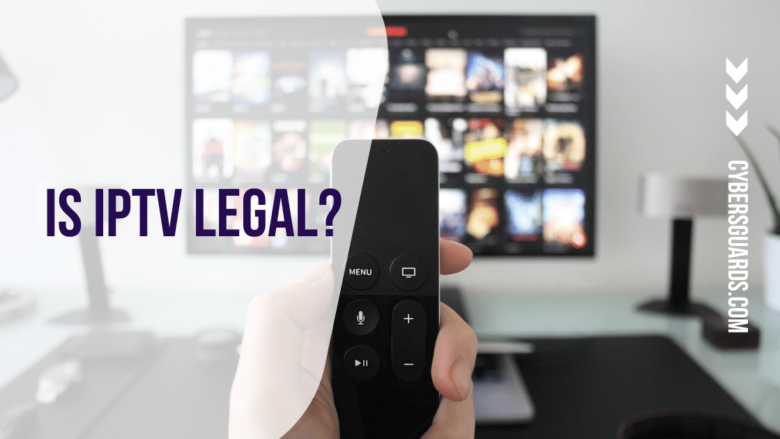Have you ever been curious about IPTV and if it is legal or not? Here’s how it might work and how to tell if it is or isn’t.
IPTV stands for Internet Protocol Television. Television is a catch-all phrase for services that allow users to watch television over the internet. Online streaming and VOD (video on demand) are common types of IPTV used to watch your favorite TV shows and movies in a world where convenience is king.
IPTV is a type of on-demand access that allows viewers to watch what they want, when they want, rather than using analog transmissions to offer consumers with a defined schedule of TV.
IPTV services save content on servers, so it does not need to be aired at set times like traditional television. Is IPTV, however, legal?
Is IPTV legal in the United States?
The quick answer is yes if you’re wondering whether IPTV is legal. The lengthy answer, on the other hand, is that it can be extremely complicated. IPTV is legal in and of itself, but not all IPTV services are.
Legal IPTV services like Hulu, YouTube, and Sling, for example, follow the necessary copyright regulations. This means that if a service provider does not have the proper permits for the content it delivers, it is illegal.
A lawful IPTV service must follow intellectual property regulations and secure a license for every show available. IPTV services are frequently paid for with a monthly or annual subscription.
This does not, however, mean that all free IPTV services are illegal. You will, however, most likely have to pay for it.
IPTV Regulations
The Digital Millennium Copyright Act was enacted in the United States in 1998 with the intention of deterring services like IPTV from offering copyrighted content via the internet without the proper licenses by incurring fines and penalties.
While IPTV services were punished for delivering illicit content, consumers who intentionally streamed copyrighted material faced few consequences.
However, with the adoption of the Protecting Lawful Streaming Act of 2020, the Department of Justice will be able to pursue illicit IPTV services with felony charges. The criminal consequences for unlawfully streaming such content have been dramatically increased as a result of this statute.
The Copyright Act, on the other hand, protects works such as music, films, and art, ensuring that individuals and services in Canada cannot utilize content without the owner’s permission.
The Notice and Notice system was amended in 2019 to ensure that copyright holders may not issue direct fines or demand payment if an ISP detected a user downloading or streaming unauthorized content.
Illicit IPTV users, on the other hand, may face prosecution if they are found to be willingly using illegal IPTV services.
Do You Have Access to Illegal IPTV Streams?
If you’re concerned about your streaming subscriptions, be assured that Netflix, Prime Video, and Hulu are all legal IPTV providers. Identifying an unlawful IPTV service, on the other hand, can be difficult.
A legitimate IPTV service can usually be determined only by its reputation. While not all services require a membership or payment, many illegal IPTV providers are substantially less expensive than legitimate IPTV services. Because illegal IPTV providers do not have to pay for production or license, these services are frequently less expensive or even free.
Although Bitcoin and other cryptocurrencies are becoming more popular as a means of payment for legitimate services, illicit IPTV providers prefer this way of payment because it is difficult to trace.
The quality of the content is another telling symptom of an unauthorized IPTV service. When obtaining content through illicit ways, the video and audio streams are usually of lower quality.
In addition, unauthorized IPTV providers are more likely to include pop-ups, advertisements, and bogus buttons that open external connections.
Why Should You Stay Away From Illegal IPTV?
While it’s simple to criticize illicit IPTV service providers for breaking the law, users of these services put themselves in danger in a variety of ways.
Apart from the apparent moral responsibility to shun unlawful IPTV, there are other more nefarious reasons to do so, including:
You have no control over who accesses your credit card information if you provide it to unauthorized IPTV services. Similarly, there is no guarantee that you will obtain the IPTV services for which you paid.
Illegal IPTV services may capture your information and sell it to hackers, exposing you to scams.
Streaming sites that aren’t trustworthy can infect your devices with viruses and malware. Download links, phony play buttons, and pop-up advertising are common examples.
Your ISP may disable or cancel your services if they discover you are streaming illicit content or using an unauthorized IPTV service.
Legal IPTV Providers Should Be Supported
Granted, not being allowed to see certain TV episodes, movies, or listen to particular music in your own country can be aggravating, especially when others are talking about the next blockbuster show.
For most people, however, the repercussions of unauthorized IPTV viewing are not worth it. Thankfully, there are a plethora of respectable, legal IPTV providers available who are eager to give you with lawfully obtained and licensed content.











FIND US ON SOCIALS